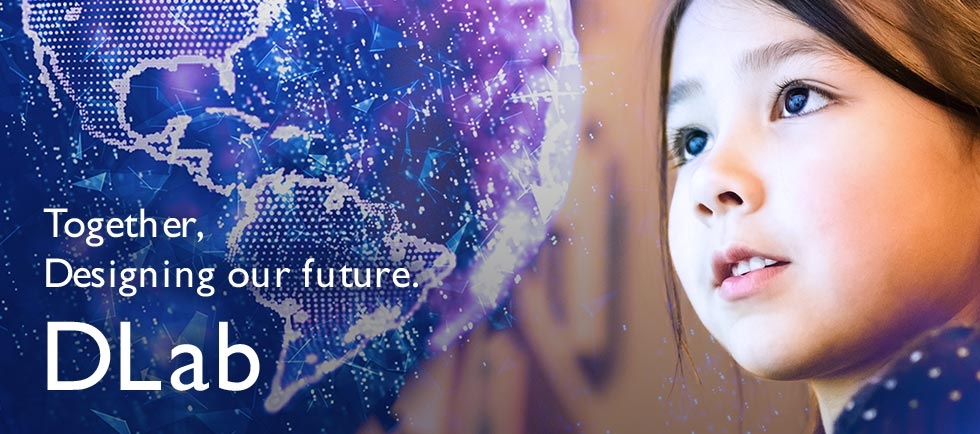On January 28, DLab Dialog Day 2023 - Designing care for the future society, was held at Tokyo Tech's Hisao & Hiroko Taki Plaza*1 . The event presented the activities of Tokyo Tech's Laboratory for Design of Social Innovation in Global Networks (DLab) over the past year and to reflect on the future we want, together with the rest of society. The event consisted of two parts: a symposium in which a variety of speakers*2 took the stage to weave together seeds, sprouts, and stems for the future, and a co-creation workshop where internal and external participants from the institute collaborated in thinking how care should be provided in the future society. The following is a detailed report of the event, attended by approximately 130 people in total.
- *1
-
The symposium session was also streamed online.
- *2
-
Speakers' and participants' affiliations and job titles are those as of the date of the event.
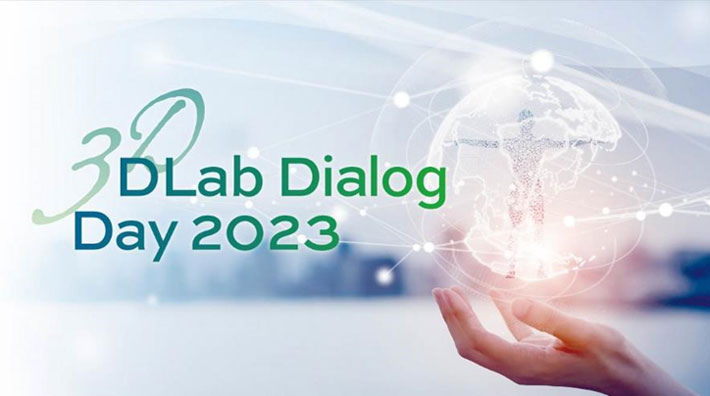
Program
- 1.
- "Introduction & Activities" - Presentation of the efforts of DLab in AY2022
- 2.
- "Seeds for our future world" - Students' visions of our future society - Presentation by students of the course "Introduction to the Design of Future Society" and presentation of "DLab Partners" who participated in the lecture
- 3.
- "Future research sprouts" - Paths to the realization of the future image - Research presentations and a panel talk by DLab Challenge Research Grant
- 4.
- "Trunks of future creations" - Anticipating the creation of our future society - Business leaders and researchers discuss research oriented toward our future society; with Yuka Tanimoto, Forbes JAPAN
- 5.
- Closing
- 1.
- Orientation
- 2.
- Keynote speech 1 "Health of the global environment - Focusing on water and climate change -" Professor Shinjiro Kanae, School of Environment and Society, Tokyo Institute of Technology
- 3.
- Keynote speech 2 "Social Determinants of Health: Our health isn't just a matter of willpower" by Professor Jun Aida, Graduate School of Medical and Dental Sciences, Tokyo Medical and Dental University
- 4.
- Group works
- 5.
- Closing
Symposium
1. "Introduction & Activities"
The morning symposium began with opening remarks by Tokyo Tech President Kazuya Masu. President Masu stated that his experience at DLab in discussing the future we want has given him the strength to think in depth about his vision for Tokyo Tech as president and to make drastic reforms. He expressed his hope to the participants that this event would be a meaningful opportunity to think about our future in an exciting way.
DLab Associate Director Naoto Ohtake, Director of the Institute of Innovative Research, gave an overview of DLab and its activities in the 2022 academic year. DLab's approach is: "While engaging in broad dialog with people both internal and external to the Institute, we think about the future that we want to have rather than the future that we should have, and we will also consider the science and technology and policies needed for realization."
He also explained the 24 "future scenarios" of a future we want that have been developed through dialog with the society, the "Tokyo Tech Future Chronology" that organizes the scenarios in chronological order, and the Vision 2020 "Transchallenge" that changes the concept of a "challenge" by creating a system that accept failure in an embracing manner.
2. "Seeds for our future world": Our future society as envisioned by students
As one of its activities, DLab emphasizes "outreach and awareness to society and the next generation," and has developed a course for undergraduate students, "Introduction to the Design of Future Society." In the second session, "Seeds of Future Society," students presented their visions for the future society.
This course is taught by Professor Hiroichi Yanase and Associate Professor Renge Jibu, who belong to Tokyo Tech's Institute for Liberal Arts and are members of DLab. The students formed groups to discuss a vision of the world they would like to live in when they turn 50 in 2050, and publish it in the form of a newspaper. Members of DLab Partners, a group of companies that support DLab's activities, have also participated in the class, providing information from a corporate perspective and helping to engage in dialog with the students.
After Professor Yanase gave an overview of the course and DLab member Hajime Nitta, Senior URA (Head of Research Development Section, Office of Research and Innovation), introduced the DLab Partners activities for the 2022 academic year, the student groups presented a newspaper on the following seven topics created in the course.
-
"Health and welfare": Depicts the care of humans by clones of themselves, the advent of artificial eyes with zoom function, and the use of regenerative medical technology to improve the quality of sleep and mechanize people.
-
"Abundance from our ocean": An article posted described that in our future 60% of sushi is made from farmed or cultured fish meat, a daycare center is attached to a conveyor-belt sushi chain restaurant, and the start of real-world implementation of seawater desalination technology.
-
"Diversity": News coverage of a generative AI based on data from people with diverse backgrounds becoming CEO of a global IT company, introduction of "LGBTQ+ quota" in university entrance exams to create a diverse student body, etc.
-
"Hunger": Envisions a global future where the number of people suffering from hunger becomes less than 10,000 thanks to technologies that recombine the components of garbage into food, accelerate crop growth, and smart agriculture.
-
"Urban development": Presenting a future of city both in terms of residence, such as migration to Mars and artificial satellites, and in terms of lifestyle, such as the advent of small cabs with fully autonomous driving.
-
"Energy": Posting news such as the start of power supply to artificial satellites for immigration by solar power generation on the moon after converting all the energy required on Earth to renewable energy.
-
"Foundations of industry and technological innovation": Introduction to topics as diverse as the elucidation of human consciousness, migration to virtual space, the opening of a space elevator, and the advent of AI legislators.
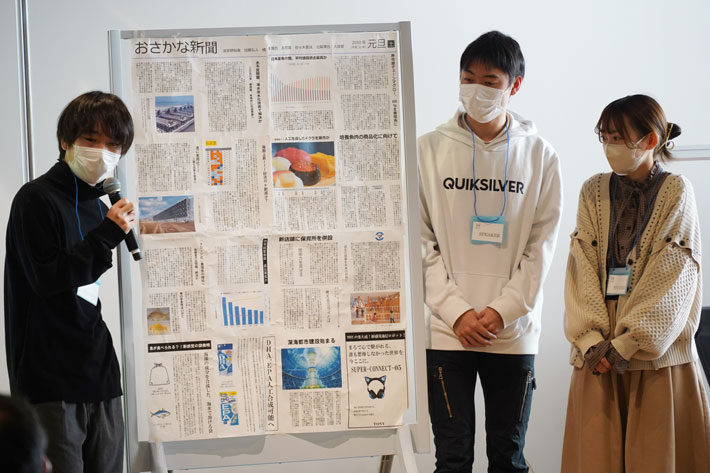
Students presenting on the topic "The Abundance from our ocean"
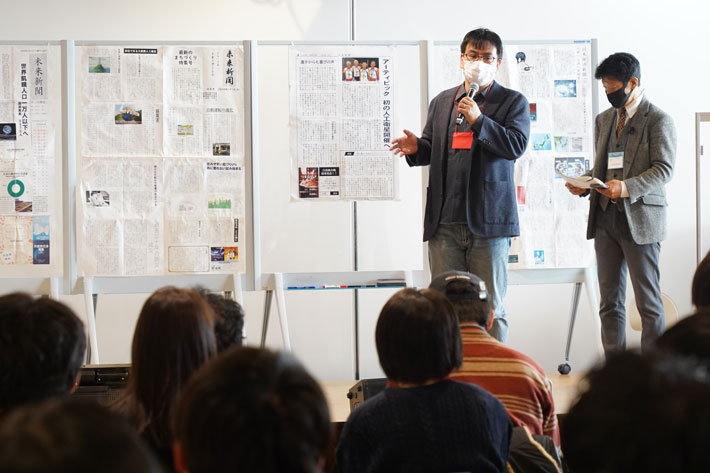
DLab Partners members and Professor Yanase (right) commenting on the presentation.
In between each group's presentation, Associate Professor Jibu, moderated the key points of each group's presentation. During the free dialog session held after, Professor Tamio Nakano from the Institute for Liberal Arts, who launched the course, said the act of seeking answers to questions for which there are no correct answers, and "envisioning the future we want," will lead to the realization of that future. In addition, many comments were received from members of DLab Partners and Tokyo Tech faculty members.
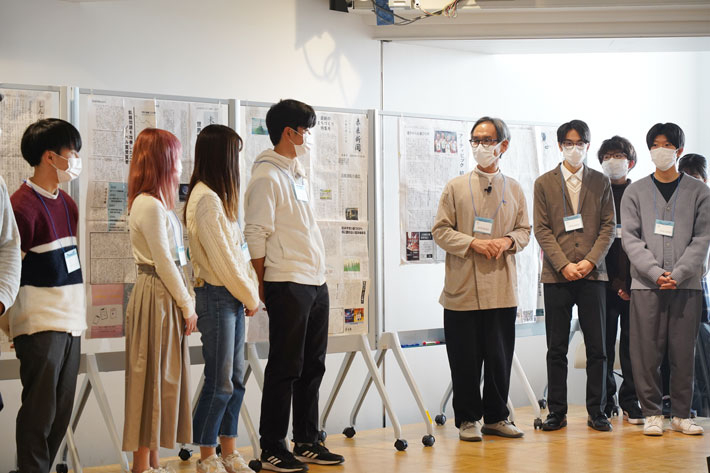
Professor Nakano (center right) commenting on the newspaper, and students who took the course.
3. "Future research sprouts": Paths to the realization of the future image
DLab has been supporting research that leads to the realization of Tokyo Tech's future scenarios through the DLab Challenge Research Grant. The "Future research sprouts" session featured presentations and panel talks on research newly supported in the 2022 academic year.
Development of PFOS treatment technology for solving the environmental problems originating to US military bases
Principal Investigator: Associate Professor Toshihiro Isobe, Department of Materials Science and Engineering, School of Materials and Chemical Technology
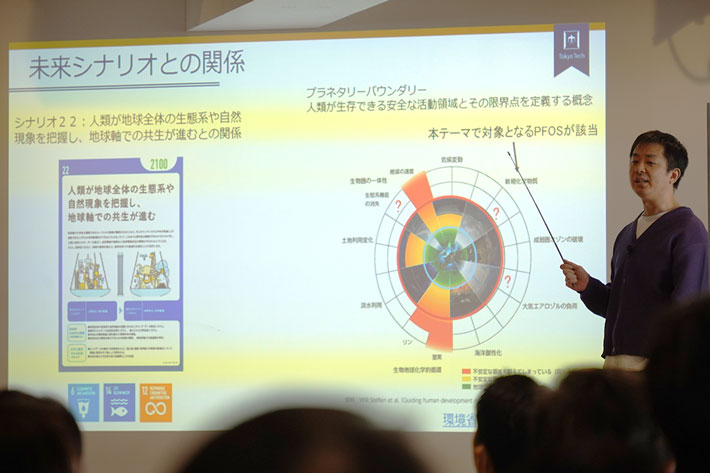
Presentation by Associate Professor Isobe
Through the development of a removal system for persistent organic pollutants and PFOS, a global environmental issue, and through interdisciplinary research consisting of an investigation of the actual problems caused in the neighborhood of U.S. military base as one of the emission sources, we examine the potential for new technologies to solve societal issues.
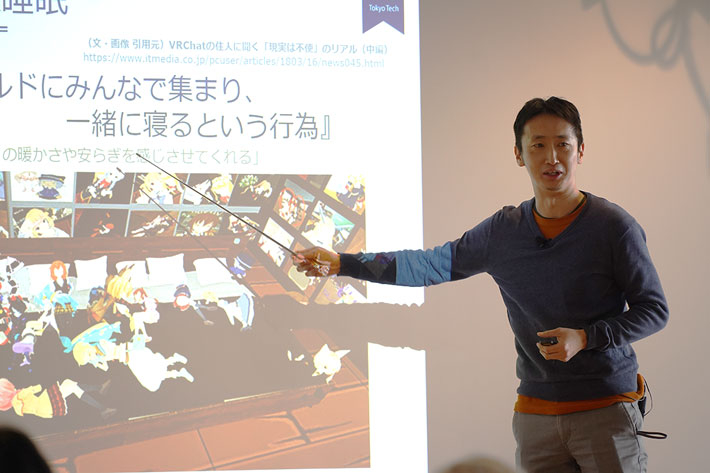
Presentation by Associate Professor Funakoshi
This project explores ways to overcome the various physical and environmental barriers that exist in VR spaces (e.g., restrictions on avatar behavior due to control interfaces) through collaboration among researchers in engineering and the humanities from various fields, and create a VR world where everyone can interact and challenge themselves without stress.
No victim left behind: Transdisciplinary design research for future megathrust earthquake and Tsunami through cosmic-eye view
Principal Investigator: Associate Professor Takumi Ohashi, Department of Transdisciplinary Science and Engineering, School of Environment and Society
*Assistant Professor Takashi Tomura, Department of Electrical and Electronic Engineering, School of Engineering, a co-researcher, is in charge of the presentation.
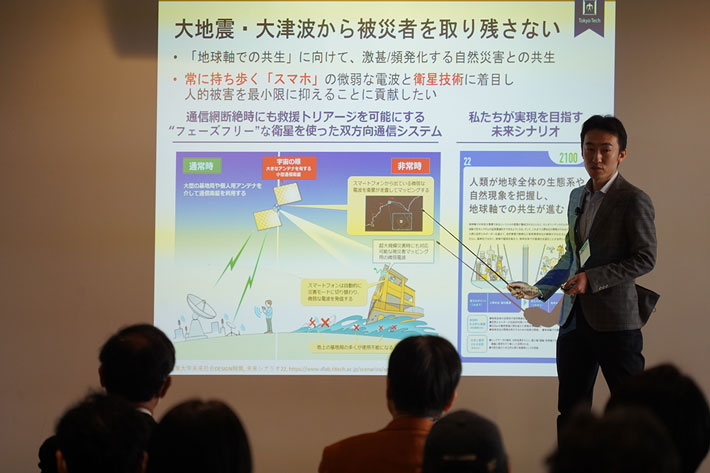
Presentation by Assistant Professor Tomura
By connecting next-generation communication satellites which can switch between normal and disaster phases with smartphones, the population distribution of disaster victims can be quickly determined in the event of a large-scale disaster by capturing the weak radio waves emitted by smartphones. The project also examines methods of social implementation through transdisciplinary research.
After the presentations, a panel talk was held, moderated by Deputy Director Ohtake, with DLab members Takao Kuramochi, Deputy Director-General, Center for Research and Development Strategy, Japan Science and Technology Agency, Vice President Noriyuki Ueda, (for collaboration in liberal arts and STEM), and Vice President Kaoru Kuwata (for research development).
In a way related to the event's topic of "Designing care for the future society," he said "The true well being of society is achieved through investigating the overlap of technology with people's emotional pain and value for life. I sensed these ideas in the three topics presented," and "I felt that science and technology are reaching a level where they can achieve the happiness of each and every human being."
4. "Trunks of future creations" - Anticipating the creation of our future society -
In the "Trunks of future creations" session, moderated by Yuka Tanimoto, executive officer and web editor-in-chief of Forbes JAPAN, the Japanese edition of the global economic magazine, business leaders and Tokyo Tech researchers discussed the path to creating the future.
DLab member, Junko Mokuno, Vice president of Trail INC., first explained the purpose of the event, and then Ms. Tanimoto gave the direction of the talk, saying she would like to think about methodologies to envision the future we want through dialogue, before introducing the panelists' activities.
The first to introduce his activities was Mr. Yuki Tazaki, Founder & CEO of KANDO, engaged in designing innovative technologies for real world implementation that can change our world. Mr. Tazaki spoke about his involvement in a medical cyborg venture that he supported as a member of a venture capital firm, as well as his efforts to address the issues of sea level rise and seawater damage through his marine construction project at N-ARK Co. Ltd, where he serves as the president.
Associate Professor Hiraku Sakamoto, School of Engineering explained his own research aimed at building large space structures and the Engineering Design Project, a problem-solving course he teaches at the graduate school. Working with students from a variety of universities, including schools of arts and design and women's colleges, as well as Tokyo Tech, participated in this lecture, in which they conducted user surveys and made prototypes, aiming to create new user value in line with the theme of the company.
In the panel talk that followed, Ms. Tanimoto, Mr. Tazaki, Associate Professor Sakamoto, and Ms. Mokuno raised the issue of the disconnect that exists between "basic" and "applied" sciences, such as basic science (=science) that explores the truth and applied chemistry that is responsible for real world implementation, and basic companies and applied companies, as a problem in Japan today. In response to this, attendees had further comments such as "The link between the 'basic' and the 'applied' requires people who understand both and have the ability to execute, and a team of people with a variety of abilities can fill that role." "PBL-style learning, in which diverse individuals work in teams to tackle challenges, is a venue for developing these human resources." "Working with members from different fields provides an opportunity for students to reevaluate and strengthen their expertise."
Regarding tips for finding research and business topics that aim to solve social issues, two panelists said, "It is important that the issue and your own motivation match, otherwise you will not last long," and "It is important to just go to the front line, see many things, and talk with many people."
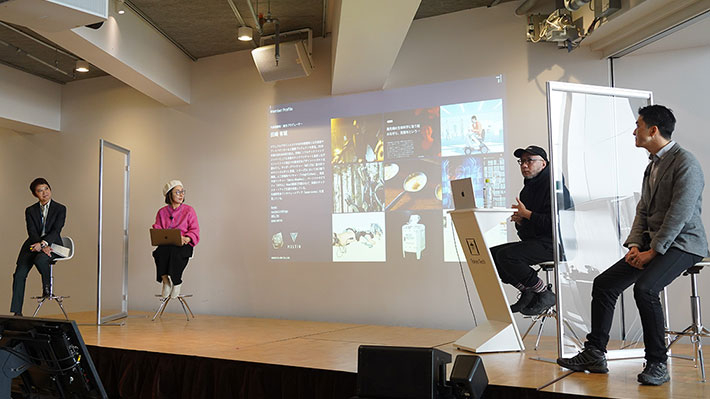
Panel talk
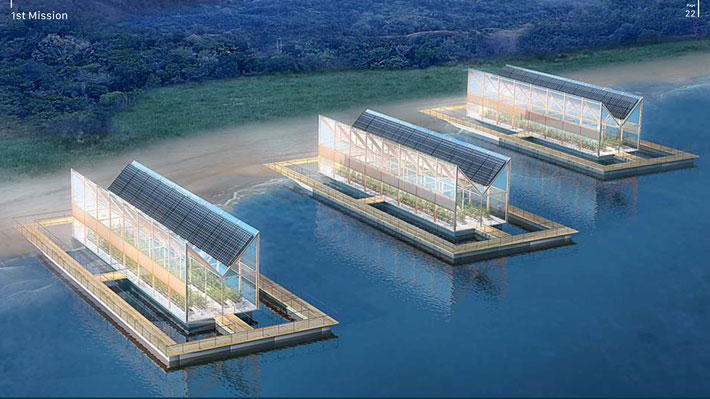
Concept art of the marine architecture to be implemented at N-ARK, from Mr. Tazaki's project presentation (© N-ARK)
5. Closing
After each session of the symposium, DLab Director Isao Satoh, Tokyo Tech's Director General and Vice President for Planning took the podium to deliver his remarks. In his closing remarks, he stressed the importance of continuing to think about how we "want" things to be, rather than just following what the norms of our surroundings and society demand. He also expressed his thoughts on the future activities of DLab, where we can share and exchange our desired outcomes and create new insights.
Co-creation workshop - Designing care for the future society
1. Orientation
Co-creation workshop was held in the afternoon. First, in their capacity as members of the DLab, Professor Nakano and Professor Asa Ito, Director of the Future of Humanity Research Center, Institute of Innovative Research, who facilitated the workshop, took the stage and gave a brief explanation of DLab's activities to date.
2. Keynote speech 1 "Health of the global environment - Focusing on water and climate change -"
In keynote speech 1, Professor Shinjiro Kanae, School of Environment and Society, also a member of DLab, explained the current status of "the health of the planet" from both scientific and social perspectives.
At the beginning of his speech, he talked about the "Global Risks Report 2023" published by the World Economic Forum, which ranked a number of global environmental problems, such as failure to curb global warming, natural disasters and extreme weather events, species decline, and ecosystem collapse, as top risks.
At the same time, he also spoke of social trends such as the growing awareness of global warming, ESG investment, and the private sector becoming more environmentally conscious. He also presented an outlook based on the latest research that "as the world has changed significantly in response to global warming, the global temperature rise is not likely to reach 6 degrees as was once predicted as the worst-case scenario, but is likely to settle at around 3 degrees."
He also presented key points on how to respond to climate change, such as the importance of creating synergies that will have a positive impact on other areas of the SDGs, including poverty, welfare and health, and the abundance of the sea and land, as well as the results of a study in which Professor Kanae was involved, which found that countries that have achieved a higher level of SDGs were less affected by the COVID-19 pandemic. He concluded his speech by pointing out that "whether it is environmental issues that deal with the health of the planet or medical and dental issues that deal with personal health, when major problems occur, those most affected are people in poverty and other vulnerable situations."
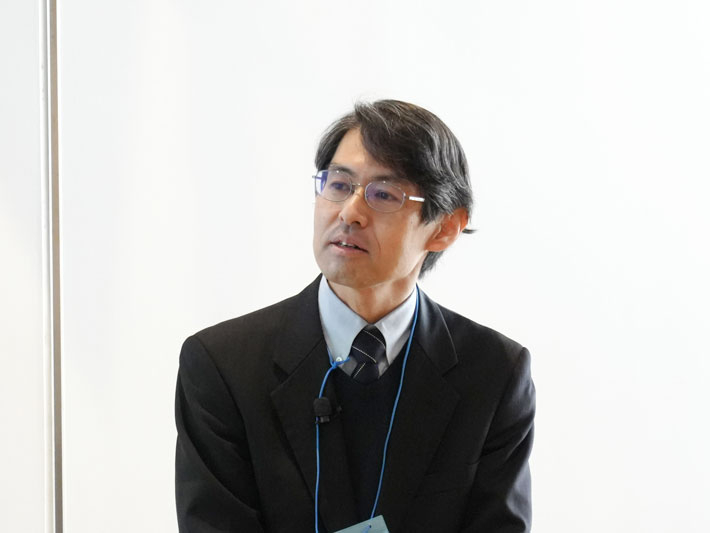
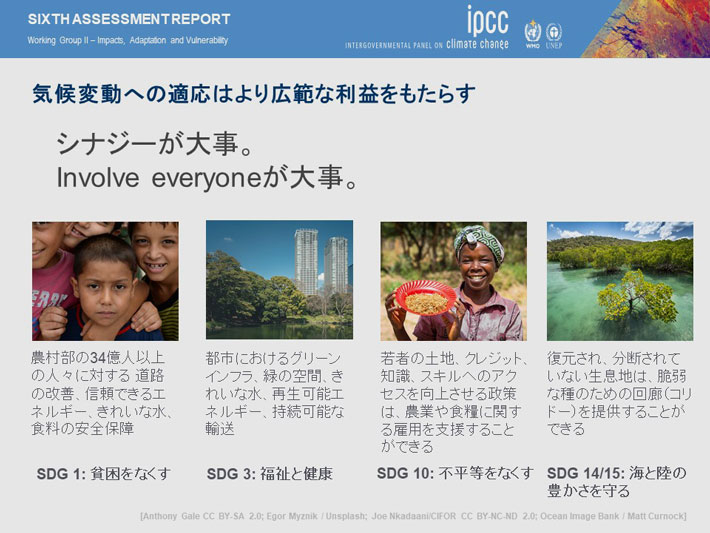
Professor Kanae's speech
After his speech, he and Professor Ito talked about the case of people with disabilities who have difficulty eating and drinking due to the elimination of bendable plastic straws. As a way to resolve this conflict between the health of the planet and personal health, it was suggested that it is important for individuals from diverse backgrounds, with a wealth of experience and perspectives, to respect each other's opinions and continue to engage in dialogue to find a common ground.
3. Keynote speech 2 "Social determinants of health: Our health isn't just a matter of willpower"
In the second keynote speech, Professor Jun Aida of the Graduate School of Medical and Dental Sciences, Tokyo Medical and Dental University, described various factors that affect personal health, citing numerous specific examples.
In his opening remarks, Professor Aida pointed out that human health is influenced not only by biological factors such as gender and age, medical factors such as exposure to bacteria, and individual lifestyle habits, but also by social relationships, economic conditions, culture, and environment that influence human behavior.
As specific examples, he cited the results of a study he was involved in, which showed that when people moved into temporary housing after the Great East Japan Earthquake, the rate of mutual aid was higher and the rate of PTSD was lower when people moved into temporary housing in groups with their neighbors, and the rate of tooth loss increased when economic conditions deteriorated or homes were damaged due to the disaster. He also presented the results of the Ministry of Health, Labour and Welfare's efforts to utilize social capital, the trust between people in the community for long-term preventive care.
The conversation then shifted to water-based measures to achieve public health. He introduced an overseas measure to add fluoride which prevents tooth decay to tap water (water fluoridation), and an example from a Japanese school where fluoride mouthwash reduced the prevalence and inequalities in tooth decay.
In a talk with Professor Nakano after the lecture, they cited the abolition of mass vaccinations at schools as an example, saying that even when trying to implement measures with proven medical benefits, it is difficult to explain their significance and safety and gain public understanding, and that the cooperation of various stakeholders is essential for implementation.
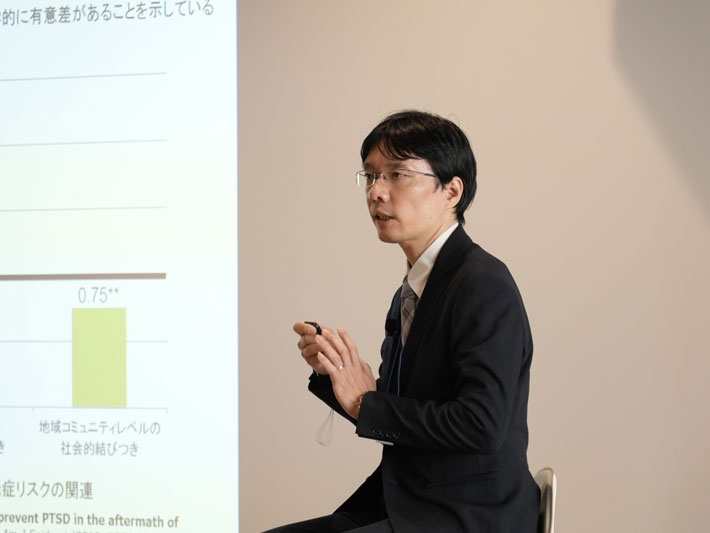
Professor Aida's speech
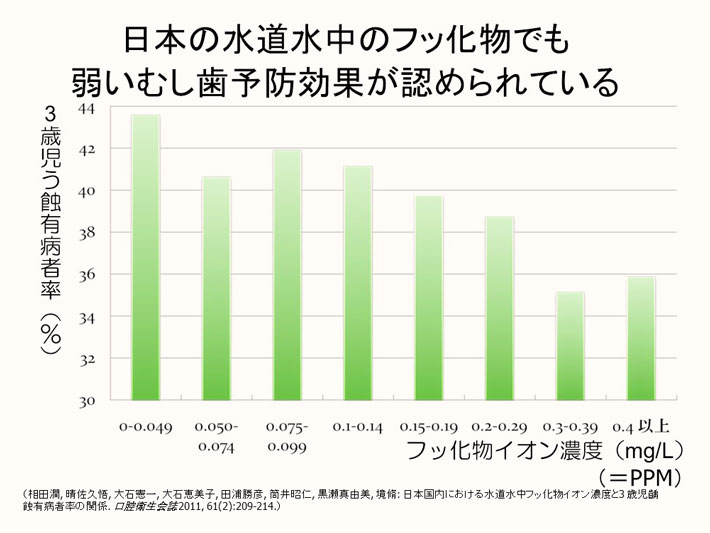
A study of the natural fluoride concentration in tap water and caries prevalence in Japan
4. Group works
A total of 60 people, including President Masu of Tokyo Tech and President Yujiro Tanaka of Tokyo Medical and Dental University, the two universities expected to merge, participated in the final group work session of the day, working on a three-step task.
The first task was a small group dialogue based on the keynote speeches to deepen thinking about "Care for the future society". Facilitator Professor Nakano explained at the beginning of the work that "dialog" is different from "discussion" to find the right answer, and is a creative exercise to discover new things through cooperation among speakers. He mentioned three tips for dialog: "Listen carefully," "Speak briefly," and "Visualize". Participants then broke into small groups of four to discuss what had impressed them in the two speeches and what they thought about the health of the planet and personal health.
The second task was group work to design "Care for the future society". Participants were briefed by Professor Nakano and Professor Ito, and then formed groups of 3 to 5 according to their interest in "what kind of place in the future society they would like to think about". Each group freely shared ideas about care-oriented future homes, hospitals, universities, restaurants, cars, and communities and compiled their ideas onto a sheet of poster paper about their vision of the future society.
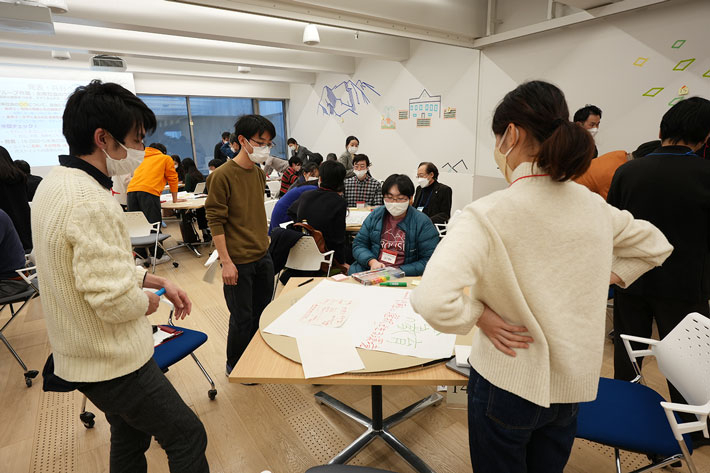
Participants working in groups
The third and final task was a presentation of the vision of the future society drawn in accordance with the theme. Fifteen sheets of the vision of the future society compiled by each group were posted on the wall of the workshop space, and one group member stayed behind to take turns explaining the vision, just like a poster presentation at an academic conference. Meanwhile, members of the group who were not in the role of explainer made the rounds observing other groups, and even during this presentation, new dialogues popped up around the room.
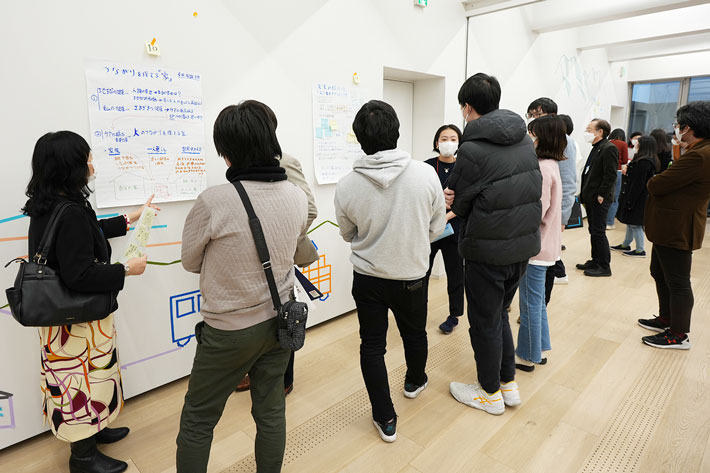
A successful presentation
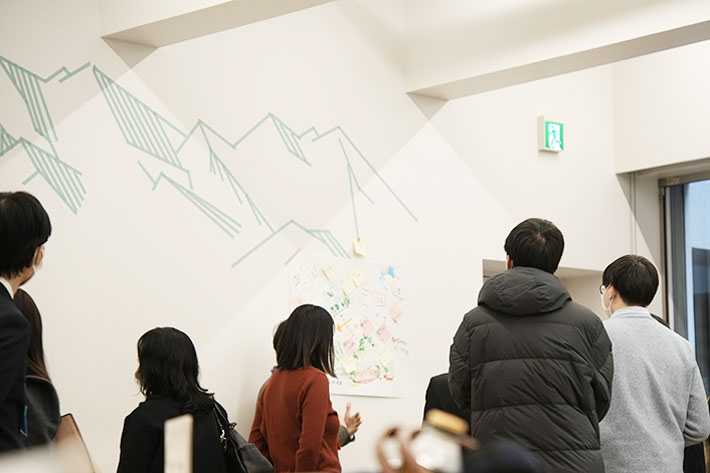
The wall depicted scenes of nature, buildings, and other objects that emulate the city
The group work, in which participants of different ages and positions worked together on the design of the future society from an equal vantage point, was conducted in a friendly atmosphere with laughter throughout. Some of the visions presented were unique, such as "a system to enjoy care as entertainment" and "a workplace connected by public bathhouses." It was evident that the discussions were free from preconceived notions, and that the participants were free to let their imaginations run wild.
At the end of the work session, both presidents expressed their impressions of their involvement, with President Tanaka of Tokyo Medical and Dental University commenting, "I was able to have a dialog with a diverse range of people, which was very helpful for the reform of the university hospital that we are currently working on. I think that if President Masu and myself continue to proactively create opportunities like this at both universities, the momentum toward integration will build even more." President Masu then expressed his hopes for the next meeting, saying, "Next time, I would like to consider together with you all what kind of university we would like to be."
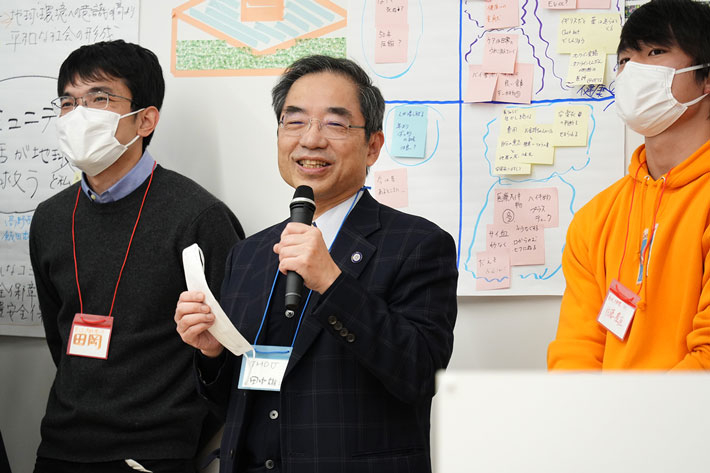
President Tanaka of Tokyo Medical and Dental University
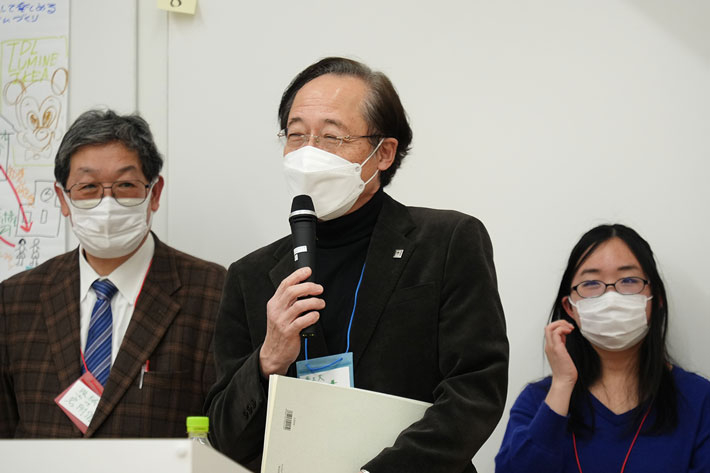
President Masu gives their impressions of the workshop
5. Closing
DLab Dialog Day 2023, the first in-person DLab event for the general public in three years, was a great success with many participants from within and outside Tokyo Tech. As society moves toward a post-Covid world, DLab will continue to move forward toward its goal of "openly considering an ideal future together with society's stakeholders," while further strengthening its efforts in various areas, including these participatory events.
Participants offered a wide range of feedback:
"It was an opportunity to broaden my horizons by being exposed to new topics and different opinions."
"It was stimulating to see people of all ages and positions thinking about the future of our society."
"I experienced a cycle of dialogues in which my opinions were heard without dismissal, the conversation expanded, and new topics were evoked in me. I am glad I took the plunge and participated."
. Any information published on this site will be valid in relation to Science Tokyo.




















